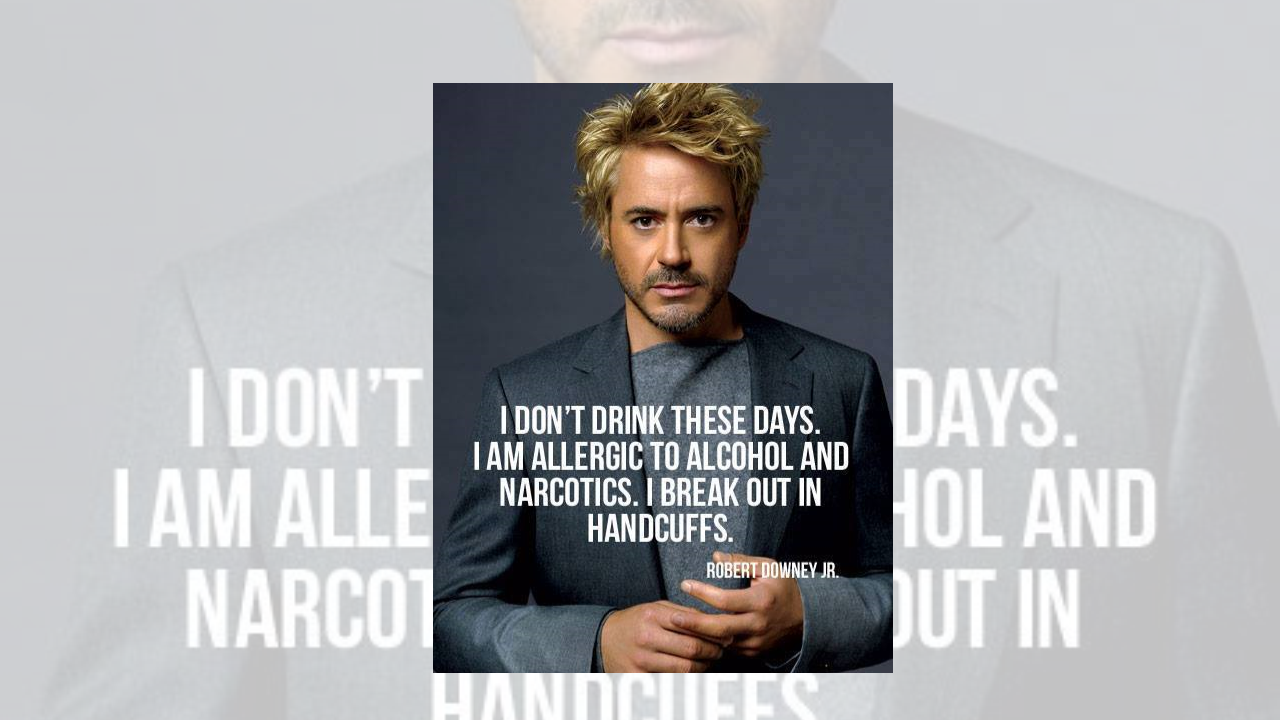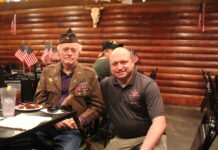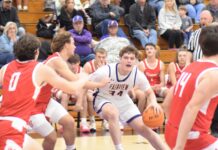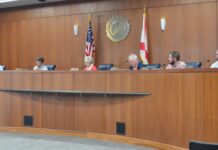CULLMAN – Tom continues his story, “In March 2011 I knew I was at a point where I couldn’t go on. I had no place of my own and was sleeping on the couch at a longtime friend’s house who was using too. My body was dying, my mind was dying, I was miserable any time I was awake. I would gather change to go buy vodka every morning. Once, on the way to the liquor store at 9:30 a.m., I saw a pint of liquor in the grass by the sidewalk. It was a Seagram’s gin pint and it was half full. I picked it up and drank it. I had no idea that it was actually even gin, but I was willing to take the gamble. It was very warm gin, and it was just what I needed. This was such a low point for me. I couldn’t conceive of waking up again and doing the same thing. It was death or quit drinking and both sounded reasonable.”
Program Director of the Walker Baptist Hospital Detox Program, Christopher Allen, educates patients and their families every day with the facts. “There are four factors that influence addiction; biology (your physical self) psychology (thoughts and feelings) social environment and spirituality. Any good plan of recovery should include all four of those and most good treatment centers will address all four of those to some extent.
“Alcoholics Anonymous, and groups like that, use a system called ‘12 steps’ to address some of these spiritual issues while also helping the person to improve their social environment through new relationships. Many treatment centers use 12 steps in addition to counseling and medical care as a way to address multiple factors.”
Many addicts crave a life free of drugs and alcohol. Abstinence programs provide that lifestyle and have been the benchmark for treating addictions for decades.
The original 12-step program, Alcoholics Anonymous (AA), was founded in 1935 and its book, “Alcoholics Anonymous – The Story of How Many Thousands of Men and Women Have Recovered from Alcoholism,” was published in 1939. Although steeped in a Judeo-Christian origin, AA, when speaking of God, refers to a “higher power” that is specific and defined by each individual member of the program, thereby making it a spiritual program opposed to a religious entity.
As time passed, 12-step programs specific to other drugs of choice developed and saw similar successes.
Participation in a 12-step program such as AA, Narcotics Anonymous (NA), Cocaine Anonymous (CA), Heroin Anonymous (HA), Overeaters Anonymous (OA) or the preferred support program of the addict is deemed a fundamental part of recovery. Just as important for the addict’s recovery is the family and loved ones’ involvement in Al-Anon Family Groups that provide ongoing support and a solid basis for the family’s recovery as well.
Melanie Campbell, MA, NCC, MAC, SAP, LPC-S, of TurnAround Counseling Services, LLC, shared, “Most addiction treatment professionals would agree that the longer a person remains in treatment the better their outcome tends to be. A gradual step-down method is preferred (beginning at detox if necessary and moving into a crisis residential program (where you learn the basics about addiction and recovery) followed by residential (where you begin to put these things in practice and address personal issues that could hinder long-term recovery), transitional (where you put your knowledge to the test as you are beginning to get out of the safety bubble you have been in during primary and secondary treatment), outpatient (where you can see if you can make it in your home environment utilizing the knowledge and experience you have gained) and aftercare (to help you maintain) until only 12-step meetings are left.”
As inpatient treatment can be costly and insurance coverage can be insufficient, finding recovery can seem impossible to those without the financial means to go away to rehab.
Campbell has a solution that meets those needs as well. “We utilize the state subsidized programs for those who do not have health insurance. We work out a payment plan for folks who cannot afford outpatient. We have resources that help with job placement and even transitional housing. We have an intern that provides free individual counseling. We do everything we can to get people the help they need. Of course 12-step programs are always free-of-charge and most will give a ride to someone who is genuinely interested in attending.”
Tom had experienced AA during a previous attempt at sobriety and had seen the positive results evidenced by people who attended the meetings and took the suggestions of the literature and peers within the meetings.
Tom tells of what happened later in the day when he drank from the bottle on the side of the road. “That night I got on my knees and prayed for just enough sanity and relief to not drink the next morning. When I woke up, I knew it was time. I went through a dangerous couple of days of unsupervised withdrawal (not recommended) and then went to a meeting my third day. I was grateful to be alive and I was desperate to not drink again. Desperation and determination are very helpful. I went to every meeting I could. I didn’t have a job, I was destitute poor, and my friend was about to kick me out. Meetings were my lifeblood. I felt hope for the first time in months and months.”
He continued, “Meetings can get you sober, but involvement and connection to a higher power will keep you sober. I got a sponsor immediately. By five months sober, I had worked all 12 steps as earnestly as I could then. I continued to go to meetings and tried really hard to incorporate the principles of the program into my everyday life. I had to look at the positive side of everything and be grateful for it. The first year of my sobriety was really hard. I had done a lot of damage in my addiction, and I had left a trail of trash and burned a lot of bridges. I had to not let that get me down and focus on doing the next right thing. I didn’t get anything handed to me that first year, it all came with hard work. It would lay down the foundation of gratitude and readiness that allowed for a total overhaul of my person.
“Today everything is different. I love my life. I am the happiest I have ever been. I have a good job, a wonderful wife, a car, dogs, you name it. All of this is because I am sober and I make sure to never forget that. I pray regularly to my ever-changing higher power. I go to meetings regularly. I have a couple of sponsees and a sponsor. I remember to be humble and pause when agitated. I don’t do anything perfectly, but when I am wrong I make sure to admit it.”
Bob, our other friend we met in last week’s article, tells of his beginnings in recovery. “I was sent to a long-term treatment in a halfway house after prison. I started attending 12-step meetings as soon as I got there. There, an important thing happened. I walked out of a meeting and there stood a person I ran around with while using, and he was sober. There was something different about his eyes. He told me it would work for me too. That opened my mind enough to give it a try. I asked another man for help (what we call a sponsor in 12-step meetings) and worked the 12 steps. Because I worked the steps in my 12-step program, I developed a relationship with something that saved me.”
The first days sober were rough. It was tough, but it was so worth it. The life I have today is unbelievable. I went from being a person who was afraid to be in the world and was mad at the world to the person I am today. Some say it is miraculous. The parents I about killed are so proud. The son I had basically walked out on never has to see his dad loaded, and his mother and I have a friendly relationship. I have a family of my own now that includes a loving girlfriend that loves me unconditionally and her two kids who I consider to be my own. They look at me as their dad. We plan to marry soon. We get to travel, been to two national championships and places I never thought I'd see. The most amazing thing, I think, is that I can help others who struggle with the same thing. I can show them, not just tell them how I was given help. By doing that I get to see them get better, see their families get put back together and then see those folks start to help other people do the same. It is the best show on Earth and I get the front row seat. I am the luckiest guy I know.”
Meeting schedules for Cullman and nearby areas are available at:
AA http://www.ncasac.org/documents/AAmeetings/Blount,%20Cullman,%20Morgan%20Counties.pdf
NA http://www.narcotics.com/na-meeting/east-cullman-shopping-center/
HA http://www.heroinanonymous.org/HAbirminghamal1.html
OA https://oa.org/find-a-meeting/?type=0&sort=ASC&distance=50&lat=34.1437581&longit=-86.75169419999997&zip=35055&limit=100&submit=true
CA http://www.alabamaca.org/alabamaca/Home.html
Al-Anon http://www.alnwfl-al-anon.org/_districtpages/area64_d13_meetings.htm
More information for the fellowships are available at:
AA www.aa.org
NA www.na.org
HA www.heroinanonymous.org
OA www.oa.org
CA www.ca.org
Al-Anon www.al-anon.org
TurnAround Counseling Services, LLC is located at 1559 Third St. NE, Cullman, AL 35055 and can be reached at 256-739-9569.
Mental Healthcare of Cullman provides substance abuse treatment. For more information, please visit www.mentalhealthcareofcullman.org/addiction.html or call 256-734-4688.
Read part 2: http://cullmansense.com/articles/2016/05/29/addiction-game-changer-part-2
Read part 1: http://cullmansense.com/articles/2016/05/22/addiction-family-affair-part-1



























